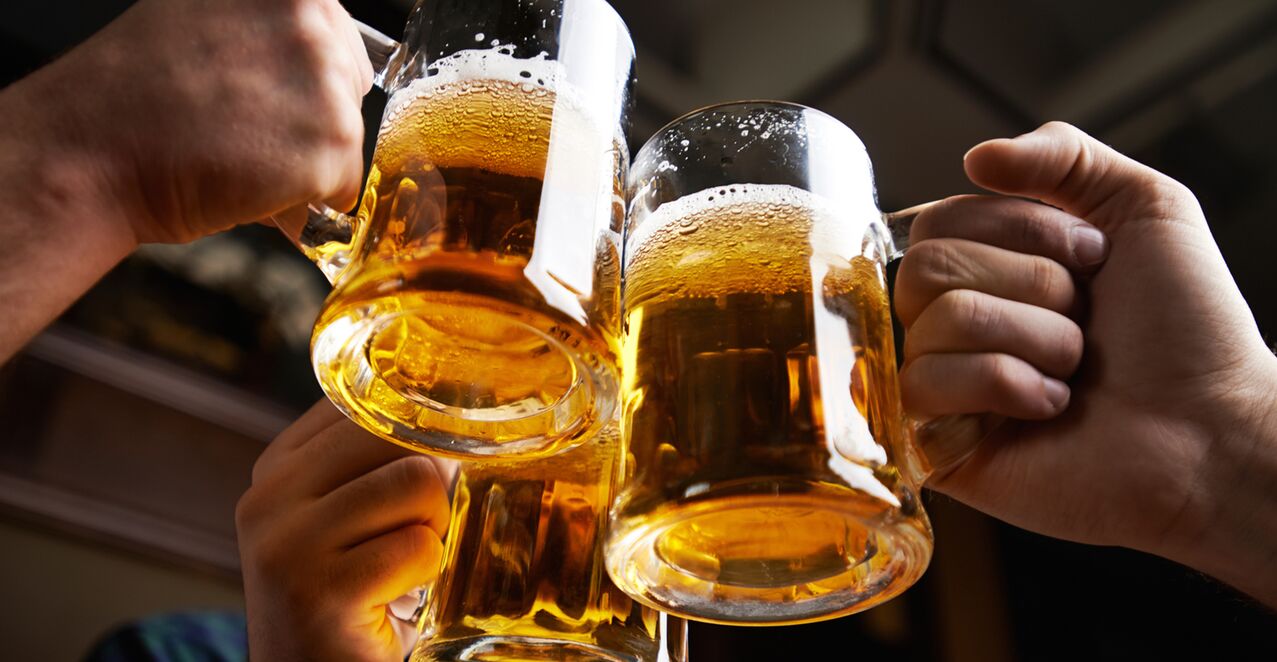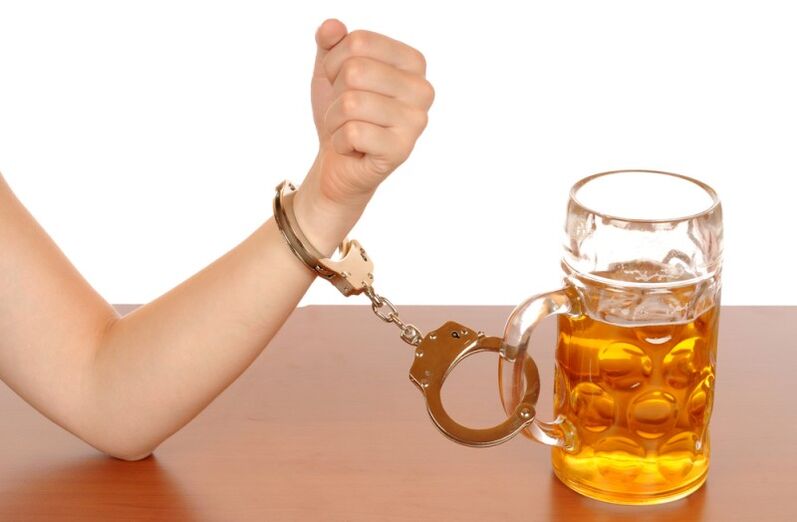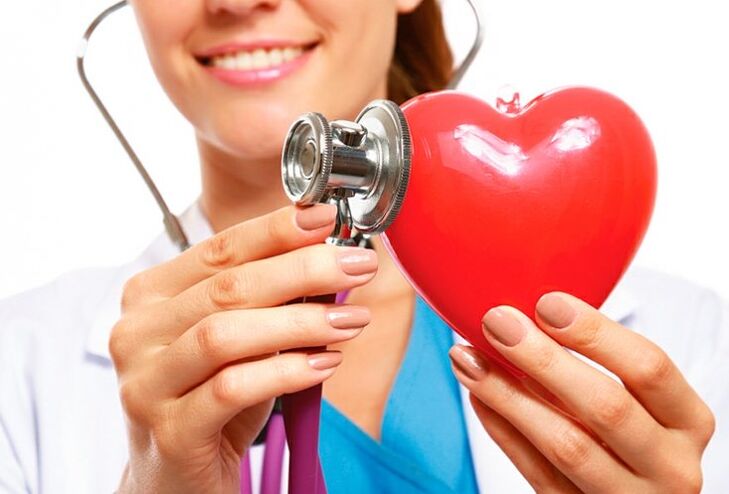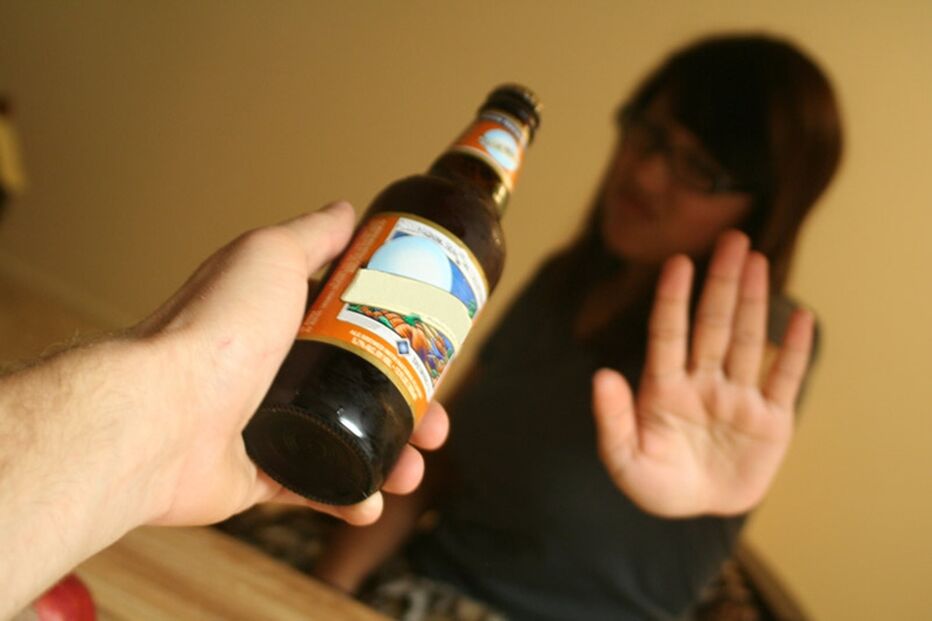Regular consumption of any alcoholic beverage cannot last long without consequences. So-called beer alcoholism develops much slower than strong alcohol addiction, and this is its particular danger.

What is the danger of beer
For the development of alcoholism, the type of alcohol does not matter. The disease is formed by drinking wine, vodka, moonshine, alcoholic cocktails and beer. The only thing that affects low-alcohol drinks is the addiction rate. In this regard, beer is considered to be one of the most dangerous drinks. And here's why.
- Alcohol contains 4 to 14%, which does not worry the majority. Indeed, in harmless drinks such as kvass or kefir, there is also alcohol.
- The beer is delicious. Unlike vodka or moonshine, which have to be "pushed" inside, the intoxicating liquid can be savored as much as you want and often you want to repeat the pleasure.
- In terms of popularity, beer ranks first in almost all segments of the population: men, women and teenagers drink it. In obsessive advertising, it is presented as a regular soft drink.
- In addition to alcohol, most varieties contain a number of substances that adversely affect the endocrine and cardiovascular systems.
If we consider the above facts in more detail, it becomes clear that there is nothing safe in this drink. Frequent beer consumption is not condemned by society. On the contrary, there are arguments in favor. It is recommended to compensate for vitamin deficiencies or to improve digestion. For this reason, many do not have a psychological stop signal, which is, for example, at the beginning of heavy alcohol abuse. Drinking vodka is considered shameful and unhealthy, and drinking beer every day is just a form of relaxation. Some do not find it dangerous to give it even to children "to promote health".
Signs and characteristics of beer addiction
The usual arithmetic calculation allows you to determine what threatens a beer binge with regular libations. In 1 liter of weak beer, 40 ml of pure ethanol, in strong varieties - 120-140 ml. In the latter case, the allowable daily allowance of alcohol for men was doubled. And if you consider that 1 liter is drunk only "for overclocking", and therefore the amount is not counted, it becomes clear that the consequences of drinking beer cannot be avoided.

From a normal hobby, addiction gradually leads to psychological addiction, while the abuser is quite confident in their well-being and does not put themselves on the same level as alcoholics, but continues to drink beer every day. You can understand that the disease is developing when the following situations appear:
- upcoming meetings with beer cause impatience and joyful expectation, for them you can put off less important things;
- intoxication comes quickly and lasts a long time;
- they drink at least 1. 5 liters per day, the maximum is not exactly known;
- the days when the usual beer is impossible for some reason, they are lived with irritation, the mood worsens, only a few new cans or bottles can return it;
- weak beer looks like water, you want to take the strongest;
- those around and the mirror begin to notice changes in appearance: swelling of the face, puffy body, bags under the eyes, pale earthy skin;
- more often than usual there is shortness of breath, chest pain, rapid pulse;
- the next morning after the beer, my head hurts, I want to drink a little more to "recover".
The appearance of even one of the signs in the background of a daily "hobby" indicates a beer addiction, the symptoms of which will be felt more strongly in the future.
Narcologists do not recognize any specifics of alcohol sickness depending on the type of drinks they prefer, but they agree that beer addiction is very insidious. It is very difficult to identify it in the first stage, since there are no pronounced changes in the lifestyle and human health. For example, a wife in a situation where her husband drinks beer every day may not notice any signs of external addiction.
Alcoholism from beer in men is often masked by somatic ailments. Heart problems, headaches and irritability are often mistaken for accumulated fatigue.
Health effects of beer abuse
The consequences of alcoholism in beer affect the intellectual, moral and personal aspects to a lesser extent. People who are addicted to the drink less often lose their professional skills, maintain the adequacy of behaviors and judgments, unlike those who drink strong alcohol every day. This is a feature of weak alcoholic beverages - personality degradation develops, but very slowly.

Another danger that awaits beer lovers is the destruction of physical health. As a result of daily alcohol consumption, severe chronic diseases develop:
- myocardial dystrophy;
- angina;
- coronary artery disease;
- gastritis;
- jade;
- fatty hepatosis;
- cirrhosis of the liver;
- neurological disorders.
A foamy drink puts a lot of stress on the kidneys, binds and removes the minerals and vitamins necessary for the body: potassium, calcium, ascorbic acid, riboflavin. As a result, the work of all internal organs is disrupted. The constant presence of acetaldehyde in the blood causes swelling, combined with dehydration, and poisons the liver and brain.
It is important that beer contains many so-called phytoestrogens. Taken uncontrollably, these substances contribute to hormonal imbalance in both men and women, leading to reproductive system malfunctions, increased risk of blood clots and increased cholesterol levels.
But the main thing for which alcoholism of beer is dangerous is uncontrolled intoxication. The pleasure of the taste of the drink overshadows the effects of ethanol, the emerging feeling of euphoria uninhibits, touches up the problems, prompting to take a few more cups or bottles. When drinking beer, it is rare for anyone to come close. Additionally, addicts often switch from weak alcohol to overuse of vodka or other "fuel".
The fight against beer alcoholism
How to deal with beer alcoholism depends on the degree of the disease and the situation as a whole. Since such abuse is not always accompanied by a loss of strong-willed qualities and mental disturbances, it makes sense for the addict to do all the work himself. The coding of beer alcoholism as a separate specific pathology does not exist. Sewing drug torpedoes under the skin or hypnosis may not work.

As with other types of addiction, the patient needs to recognize the existing situation and the need to change it. Some can do it on their own, others will need a sign from the outside. If there is no physical dependence on ethanol - the absence of beer does not lead to a deterioration in well-being, heart attacks - you can do without the help of a narcologist.
Approximate action program.
- Medicine does not recognize "small dose" methods for the treatment of alcoholism. There is no point in advising people with a painful addiction to beer to drink 1 bottle a day. This is self-deception, after a while the problem will return. Only complete rejection can help. You have to act on the "last time was yesterday" principle. This is the hardest step, but it is necessary.
- After rejection, you should analyze what bothers you the most. Boredom, a lot of free time, uninteresting TV, stress at work, a fight with a friend. Problems that have been smoothed out by drinking beer usually emerge immediately. They need to be identified and started to be addressed without delay: instead of watching TV, fixing something, going for a walk, starting to communicate with a forgotten friend, spending more time at work, with children, helping around the house.
- Boredom and irritability can be alleviated by finding something you love that you can do with pleasure. Hobbies, a new pet, playing sports, playing music, learning a foreign language, mastering a new profession. Anything that arouses genuine interest, takes effort, but doesn't leave a sense of internal compulsion, will be fine. This is the most powerful way to deal with psychological addiction.
- With an irresistible desire to drink beer, you can give the body a substitute - make juice, green tea, lemonade. A non-alcoholic version of beer is suitable at first. At the same time, after drinking 2-3 glasses of the drink, it is urgent to shift attention to some urgent matters. The brain will receive the necessary discharge, psychological stress will go away. If we are not talking about alcoholism, but just a bad habit, then you can drastically reduce the amount of beer - drink no more than 0. 5 liters 1-2 times a week, ideally even less.
The lack of a good mood and interest in life and the presence of frequent dizziness, weakness in self-treatment of beer alcoholism is a reason to visit a neurologist or an endocrinologist, as there is a possibility of developing metabolic disorders or damage to the system center nervous. In this case, the doctor may prescribe a laboratory blood test, dopplerography, brain MRI. If signs of disease are detected, it will be necessary to undergo a course of therapy with hormonal or nootropic drugs.
Prevention of beer alcoholism is to rule out replacing entertainment with a drink, fight boredom, relax, and solve problems. Like other alcoholic beverages, beer is acceptable on the party table, but you can't make it a constant companion in life or quench your thirst with it.

























